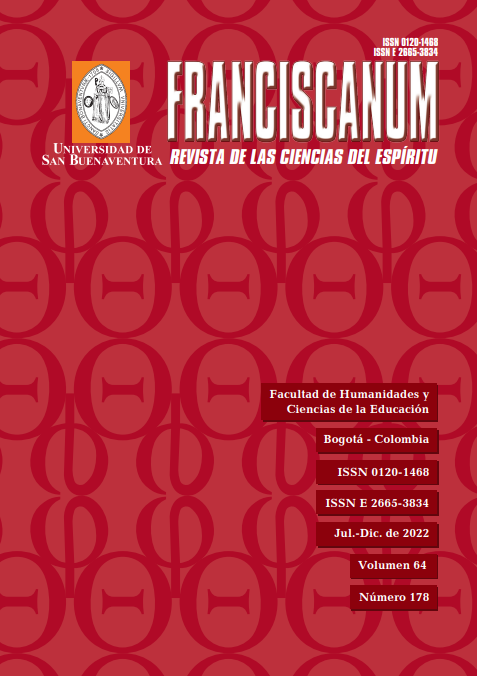This journal provides immediate open access to its content, based on the principle that giving the public free access to research helps a greater global exchange of knowledge.
Therefore, the Creative Commons 4.0 Attribution Attribution - Equal Share (by-sa) License is accepted: The commercial use of the work and the possible derived works is permitted, the distribution of which must be done with a license equal to that regulates the original work.
http://creativecommons.org/licenses/by-sa/4.0/
Along these same lines and in line with the Open Access policy, it is clarified that the authors maintain their rights to articles, without restrictions and, in the same way, they maintain their publication rights, without restrictions. They are only asked to reference the number of the Franciscanum magazine where the article initially appeared.
Abstract
This paper aims to analyze the current theories of emotions by Agnes Heller, Martha Nussbaum and Peter Hacker and the arguments they propose to rehabilitate emotions within the moral and political field. The analysis consists of four moments: first, analyses the arguments that the three philosophers propose to support the idea that emotions are important to survival and development of human life. Second, it explains what the authors mean by defining emotions as cognitive phenomena. Third, it shows the incidence of society and culture in learning and in the experience of emotions. Based on the previous clarifications, the fourth section explains more clearly the interweaving between emotions, morals and politics. The main conclusions are that despite the conceptual and methodological differences between the three philosophers, their work allows to draw coincidences and complements that give solid support to the thesis that emotions are essential for human life and its moral and political behavior. It also concludes that the results of this dialogue are a conceptual framework that can guide more specific work on the relationship of the affective world and the social and political world.
References
Bourdieu, Pierre. La dominación masculina. Barcelona: Anagrama, 2013.
De Beauvoir, Simone. El segundo sexo. Bogotá, D. C.: Random House Mondadori, 2013.
Esteban, Mari Luz. Crítica del pensamiento amoroso. Barcelona: Bellaterra, 2011.
Firestone, Shulamith. The Dialectic of Sex: The Case For Feminist Revolution. New York: Bantam Books, 1971.
Gregorratto, Federica. «Love is a Losing Game: Power and Exploitation in Romantic Relationships». Journal of Political Power 3, Vol. 10 (2017): 1-16. Consultada en noviembre 4, 2019, https://doi.org/10.1080/2158379X.2017.1382172
Grumley, John. Agnes Heller: A Moralist in the Vortex of History. London: Pluto Press, 2005.
Hacker, Peter. The Moral Powers. A Study of Human Nature, New York: Wiley Blackwell, 2021.
Hacker, Peter. Passions: A Study of Human Nature. Oxford: Wiley Blackwell, 2018.
Hacker, Peter. The Intellectual Powers: A Study of Human Nature, Malden: Wiley Blackwell, 2013.
Hacker, Peter. Human Nature: The Categorial Framework, Malden: Blackwell Publishing, 2007.
Heller, Agnes. A Theory of Feelings. Lanham: Lexinton Books, 2009.
Heller, Agnes. «Are we Living in a World of Emotional Impoverishment?». En Can Modernity Survive? 79-91. Berkley y Los Angeles: University of California Press, 1990.
Heller, Agnes. General Ethics. Oxford: Basil Blackwell, 1988.
Herrera, Coral. Mujeres que ya no sufren por amor. Transformando el mito romántico. Madrid: Los libros de la catarata, 2018.
Honneth, Axel. Freedom’s Rigth. The Social Fundations of Democratic Life. Cambridge: Polity Press, 2014.
Honneth, Axel. La lucha por el reconocimiento. Por una gramática moral de los conflictos sociales. Barcelona: Grijalbo, 1997.
Jónasdóttir, Anna. El poder del amor. ¿Le importa el sexo a la democracia? Madrid: Cátedra, 1993.
Kant, Immanuel. Metafísica de las costumbres. Madrid: Tecnos, 2008.
Lagarde, Marcela. Claves para una negociación feminista del amor. Managua: Puntos de encuentro, 2001.
Nussbaum, Martha. Anger and forgiveness. Resentment, Generosity, Justice. New York: Oxford University Press, 2016.
Nussbaum, Martha. Political Emotions. Why Love Matters for Justice. Cambridge: Harvard University Press, 2013.
Nussbaum, Martha. Hiding from Humanity. Disgust, Shame and Law. Princeton: University Press, 2004.
Nussbaum, Martha. Upheavals of Thought: The Intelligence of Emotions. New York: Cambridge University Press, 2001.
Price, Anthony. «Are Emotions Judgments of Value?» Academia, Consultada en febrero 23, 2022, https://www.academia.edu/3564561/Are_emotions_judgments_of_value
Scarantino, Andrea y De Sousa, Ronald. «Emotion». Stanford Encyclopedia of Philosophy, consultada en febrero 23, 2022, https://plato.stanford.edu/entries/emotion/
Thomas, Florence. Conversaciones con Violeta. Historia de una revolución inacabada. Bogotá: Aguilar, 2006.
Wollstonecraft, Mary. Vindicación de los derechos de la mujer. Madrid: Itsmo, 2005.



















